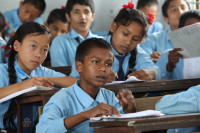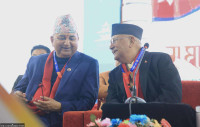Opinion
Indian imposition
The Modi government’s blockade on Nepal violates multiple international laws
Surendra Bhandari
The closure of customs points at the Indo-Nepal border by the Modi government has not only halted bilateral trade but has also brought Nepal’s international trade transiting through India to a standstill. Nepali businesses, as a result, are incurring huge losses, while the people are suffering due to an acute shortage of fuel.
The restriction imposed by India along the Indo-Nepal border raises a number of questions in international law. First, is India’s move equivalent to a blockade? Second, does this act violate the transit and trading rights of Nepal? Third, does the act tantamount to causing a humanitarian crisis? Fourth, how can Nepal remedy the situation? Fifth, should India bear any responsibility? This article briefly discusses the first three questions.
It’s a blockade
Under customary international law, blockades can only be used as a belligerent right to deny and prevent access of goods to or from the enemy. The main feature of a blockade is the act of closure of ports, customs, and transit points. The undeclared blockade on Nepal by the Modi government has actually restricted all the trading opportunities of Nepal, including that of essential consumable goods, gasoline, and liquified petroleum gas, among others. Therefore, the act of the Indian government qualifies as a blockade. However, modern international law specifically prohibits the unilateral declaration of a blockade. That is why the Indian government along with a section of the Indian media continues to refuse to define India’s act as a blockade.
Under modern international law, only the Security Council can declare a blockade by invoking Chapter VII of the UN Charter. No other institutions or countries can usurp the power of the Security Council. If there is a threat or breach of peace or an act of aggression, the Council alone can determine whether to impose a blockade under Article 42 of the UN Charter or not. Given this context, one can safely conclude that the sealing of customs points by India is an act of blockade and it is a violation of the UN Charter as a whole and of Article 42 in particular.
Transit and trading rights
The implications of a blockade are huge for landlocked countries. In case of Nepal, which is ‘India-locked’ on three sides, the decision by the giant country to restrict the border obviously violates a number of rights guaranteed by international treaties. All such treaties do not apply to India and Nepal since both the countries are not parties to all of them. In this light, refering to a few important treaties to which both the countries are party to is sufficient to confirm the egregious act of the Modi government. One of such treaties is the United Nations Treaty on the Law of Sea (UNCLOS), 1982. Articles 124 and 125 of the treaty provide a landlocked country access to and from the sea with transit rights. However, the modality of operationalising the transit rights should be designed either through a bilateral or regional treaty. Nepal and India entered into a Trade Treaty long time back and it was renewed in 2009. The 2009 treaty has guaranteed 27 customs points to Nepal for “free and unhampered flow” of goods to and from the sea and the Indian market. The unhampered use of the 27 points can only be changed after a joint review and cannot be halted or restricted unilaterally.
Unilateral actions can be taken on the grounds of essential security only for stopping the transaction of narcotic drugs and controlling the violation of intellectual property rights. The grounds for ‘essential security’ cannot be invoked on account of any internal or external political reason. Therefore, the Indian government has blatantly undermined and violated the UNCLOS as well as the 2009 Treaty.
After Nepal joined the World Trade Organisation (WTO) in 2004, the transit and trading rights of the country has been qualitatively reinforced. For almost all other international laws related to transit rights, the modality should be designed on mutually agreed terms. Under Article V of the General Agreement on Tarrifs and Trade (GATT) 1994, landlocked countries retain the freedom of transit ‘via the routes most convenient’ as chosen by the landlocked countries themselves. The application of GATT is not subject to bilateral modality but comes ipso facto—it was one of the reasons Nepal joined the WTO. In one dispute between Panama and Columbia, the WTO Panel in 2009 clearly recognised the rights of Panama to choose ‘the most convenient routes’ on its own. This establishes that the blockade by India contravenes GATT Article V.
Moreover, the WTO allows member countries to engage in trade without any restrictions and discrimination. By closing the border, India has denied Nepal’s trading rights, ie, exports and imports to and from India. Thus, the Modi government not only violates the transit rights of Nepal, but also the trading rights of Nepal under the WTO agreements. Subsequently, the loss incurred by Nepal in economic, monetary, and humanitarian terms is incalculable.
Crisis and remedy
The obvious effects of a blockade can easily result in a humanitarian crisis. Hence, modern international law takes blockade as a crime against humanity and as a war crime. It is because blockade is a tool of war and any illegal blockade constitutes a war crime. Article 7(k) of the Rome Statute of the International Criminal Court (ICC) considers any inhuman act or act of similar character that causes great suffering as a crime against humanity. The closing of customs points has prevented essentials consumable goods from entering Nepal. This has ‘caused great suffering’ to the whole country and the people in Nepal. Furthermore, the shortage of medicines has posed a risk to the lives of the people who are sick. But, both Nepal and India are not parties to the Rome Statute. Nevertheless, under grave circumstances of humanitarian crises there is an established practice for either the UN Security Council to establish an Inquiry or a Fact Finding Commission or to refer the case to the ICC. Either way, the blockade by the Modi government is a crime against humanity under international law.
Still, it may take a while to yield results if Nepal seeks a remedy under international law. Regardless, it could provide invaluable lessons to India and Nepal. Both the countries could then realise how costly it is to violate international laws in the age of global constitutionalism and in particular, to target a fragile landlocked economy. Therefore, the best solution to this problem is for the Modi government to self-correct its move and put an end to the violation of international laws. On its part, Nepal should learn that it cannot continue to conduct bilateral relations with India with a deferential political attitude. Rather, the relation between the two nations should be governed by international law alone. Only this would provide a judicious and durable solution to the ongoing problem.
Bhandari is a an associate professor of law at Ritsumeikan University, Kyoto, Japan




 13.12°C Kathmandu
13.12°C Kathmandu










